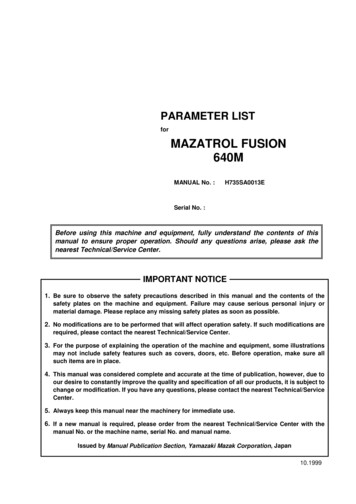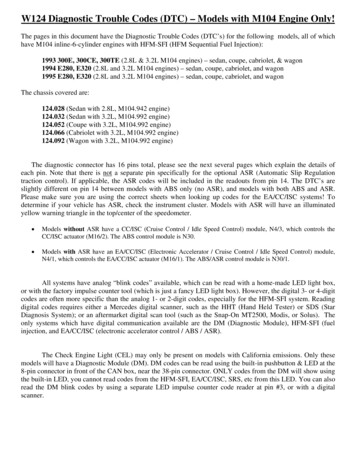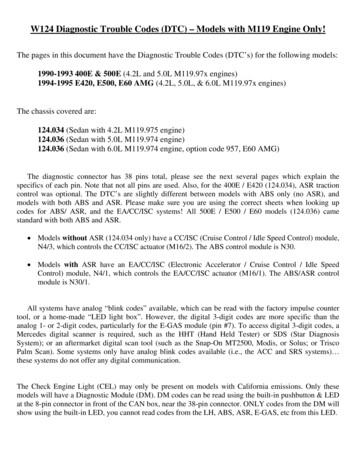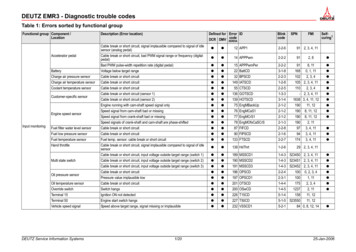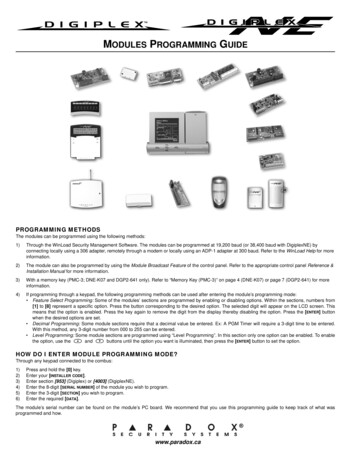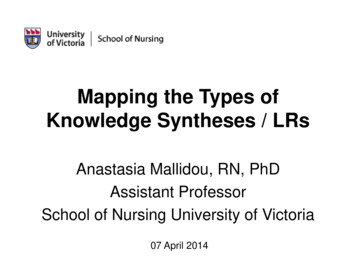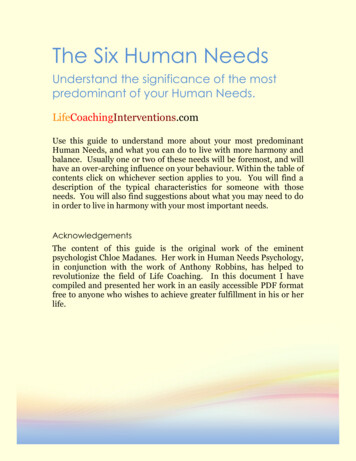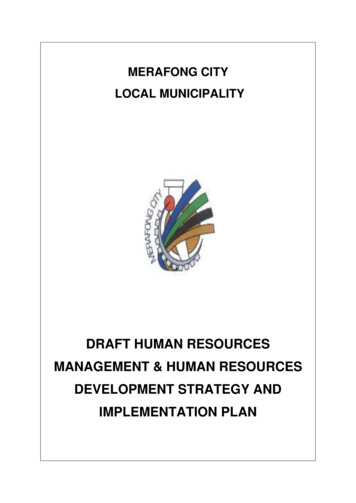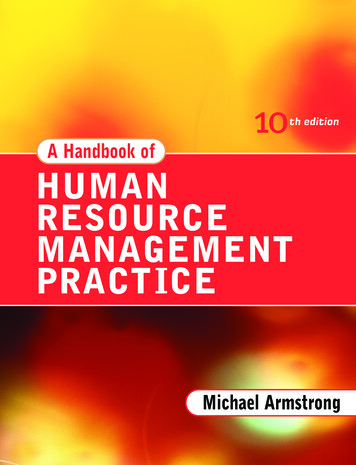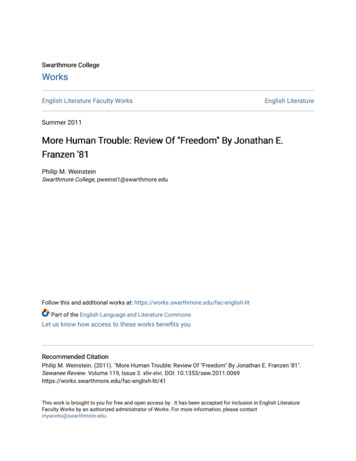
Transcription
Swarthmore CollegeWorksEnglish Literature Faculty WorksEnglish LiteratureSummer 2011More Human Trouble: Review Of "Freedom" By Jonathan E.Franzen '81Philip M. WeinsteinSwarthmore College, pweinst1@swarthmore.eduFollow this and additional works at: https://works.swarthmore.edu/fac-english-litPart of the English Language and Literature CommonsLet us know how access to these works benefits youRecommended CitationPhilip M. Weinstein. (2011). "More Human Trouble: Review Of "Freedom" By Jonathan E. Franzen '81".Sewanee Review. Volume 119, Issue 3. xliv-xlvi. DOI: fac-english-lit/41This work is brought to you for free and open access by . It has been accepted for inclusion in English LiteratureFaculty Works by an authorized administrator of Works. For more information, please contactmyworks@swarthmore.edu.
0RUH XPDQ 7URXEOHPhilip WeinsteinSewanee Review, Volume 119, Number 3, Summer 2011, pp. xliv-xlvi (Article)3XEOLVKHG E\ 7KH -RKQV RSNLQV 8QLYHUVLW\ 3UHVVDOI: 10.1353/sew.2011.0069For additional information about this 19/119.3.weinstein.htmlAccess provided by Swarthmore College (19 Aug 2014 15:41 GMT)
current books in reviewNightingale changed her last namefrom its original Nachtingale becauseit would roll off students’ lips moreeasily; by contrast her thoroughlyassimilated brother, Marvin, retainsthe original European spelling. In anupscale Los Angeles neighborhood,he lives in a palatial house onceowned by a silent-movie star—all ofwhich gives Bea, who travels there,yet another chance to level upon himmuch the same withering criticismshe had earlier heaped on Paris.Among the more important looseends that Bea ties up on her trips toLos Angeles is that of her ex-husband,Leo Coopersmith. Once dominatedby his extra-large ego (he aspires tobe an important composer) and theextra-large grand piano he left intheir living room when he departed,Bea clears out space for herself bothin the physical and spiritual senses ofthe word.Threaded through the novel areintimations of the Holocaust: Lili, theolder woman Julian falls for and latermarries, is a survivor whose husbandand young son were murdered duringthe war. She carries history with her,not only on her tattooed arm butin her very consciousness. As Beabecomes embroiled in the fate of hernephew, his spoiled and altogetherAmerican younger sister, and themysterious Lili, she finds herselfbecoming proactive to the point ofevading and even lying to her strongwilled brother. The result is a novelwith recognizable flesh-and-bloodcharacters and literary texture thatplaces each paragraph under pressureand in control.Foreign Bodies is at once anhomage to the Jamesian novel andits own entity, for Ozick has freedxlivherself at last from the trap of a toorigid, frontal imitation. She addressesindirectly the oceans of blood thatdefine the twentieth century, andin the process she discovers thatthe best way to imagine a Jamesiannovel is to turn its social castes andequations upside down.—Sanford Pinskermore human troubleFreedomby Jonathan Franzen(Farrar, Straus and Giroux, 2010. 576pages. 28)Although Jonathan Franzen hasbeen laboring in the fields of fiction for some twenty-five years,he first appeared on the nationalradar in 2001 with the publicationof The Corrections. The messageof his third novel wasn’t new, butFranzen delivered it with irresistibleauthority. An entire slew of domesticvalues prized and nurtured from thedepression-ridden 1930s throughthe postwar 1950s was no longerviable. Steadfastness, prudence, selfdiscipline, obedience to the normsmirrored by one’s neighbors’ lives (orat least by the stories such neighborstold of their lives)—all this hadbecome, for the younger generation,unbearable, and the struggle to throwit off, in Franzen’s hands, is mindbendingly funny. His prose is pitchperfect for the bitchy rhythms offamily squabble. Franzen’s best workseems to grow out of several lifetimesof penal/familial servitude.
current books in reviewNow we have Freedom—a titlethat sounds America’s most hackneyed value, the one that galvanizesour wars abroad and corrodes ourpeace at home. Franzen sounds outfreedom in a range of percussivevariations—freedom as a neuroticforce field, both psychological inits inner workings and global in itsouter effects. There is, first, thefantasized freedom of escaping fromone’s family. To be born into a familyis a common enough fate, but forFranzen its constrictive consequencesseem illimitable. Family is like CrazyGlue: a drop imposes lifelong bonding. Franzen’s people are inextricablyrelational, floundering in relationsboth sought and inherited. Try as theymight, they cannot penetrate deeperthan their own social embeddednessand discover something free-standingand uniquely their own.Few people grow up in Freedom,though this does not prevent themfrom begetting offspring. Inasmuch asimmaturity seems radical rather thanrelative, Franzen is nonjudgmental.He explores dysfunction so compellingly because he sees no alternativeto it. Being “good”—a good parent,a good child—remains mandatorybut impossible. Freud’s superegosaturates Franzen’s canvas. The backgrounded labor of Patty Berglund’sshrink enables her revised sense ofherself. More deeply backgroundedare the years, one suspects, ofpsychiatric counsel and imaginationmaking this novel possible—makingit liberatingly funny. No characterFranzen attends to escapes the essential bourgeois commandment: Behavethyself ! However hard they try, theyfail. Every post-1950s zeitgeist theyhave listened to—and Franzen knowsthem all: sex, drugs, rock music,far-out political and environmentalgroups—tells them to break free,break their parents’ laws. No matter,deep down, the law still lodges inthem, gnawing away, thwarted andvengeful.It is therefore no surprise thatillicit sex possesses a burning energyin Freedom, and Franzen is drawnto its capacity to derange its carrier. An animal endowment, sex is“prophetic”—it knows what it knows,and (like Freud’s unconscious) itnever forgets. If characters ignorethe insistent sexual directives risingin them, the pain inflicted is unremitting. Written a decade later than TheCorrections, Freedom “knows” thatsex will not last forever. All the youthful humping seems shadowed by thecoming autumn. In The Correctionsthe parents were distant enough fromthe younger writer’s imagination toescape his sexual lens (it would havebeen too awful to visit Alfred andEnid in the bedroom). But Freedomexplores sexuality from fifteen tofifty, as an urge fully (de)formative inthe adults especially. It seems morefrenetic and focused here—moreplot-shaping—precisely because itwill not last forever.The brilliance of Freedom is oftenregistered at the level of specificphrases and sentences. These areusually nihilistically perceptive: themind behind these sentences isattached to (in need of defending) solittle that would bias its grasp that it isable to enter (corrosively) the foiblesof those it pursues and to show uswhat they do not (cannot) see aboutthemselves. In Franzen’s imaginaryworld we cannot help being woundedand wounding in turn. This involvesxlv
current books in reviewa good deal of discomfort—headingtoward shame—that ensues whenone sees where one is and how onehas made others pay for it. What ismoving here is that Franzen reallydoes take “nice” seriously—as thoughhe wishes he were (but knows heisn’t) a nice person—yet sees “nice”as usually dishonest (a self-evadingstrategy) and always self-limiting. Youcan’t win by being nice. Interestedin judgment, Franzen is very strongin not judging. That is perhaps hisgreatest strength as a comic novelist:life as spectacle, not proving ground.Freedom is touching—notsentimental, but touching—as TheCorrections was not. More humantrouble is on display here, moreheartache too—all of it recognizable(but it takes Franzen’s novel to makeit recognizable), all of it implicitly thewriter’s condition as well as his characters’ and (where the shoe fits) ourown. At its core Freedom reveals thatthe only freedom we possess inheresin how we negotiate our endless arrayof constraints. Franzen’s humor andhumanity derive from the terrifyingtruth—in our face all the time butevaded no less insistently—that ourfreedom and unfreedom are constitutive dimensions of each other.—Philip Weinsteinxlvia maelstromof discontentTownie: A Memoirby Andre Dubus III(Norton, 2011. 388 pages. 25.95)Andre Dubus iii is the son of thelate Andre Dubus, a short-storywriter of some distinction whosereputation continues quietly to grow.The elder Dubus was crippled whenhe was hit by a car in 1986, and hedied of a heart attack, alone in hishome, twelve years later. He hadtaught writing at Bradford Collegein northern Massachusetts, wherehe lived with his wife, Pat, and theirfour children, two boys and two girls,after being graduated from the IowaWriters’ Workshop in the mid-sixties.By the end of the sixties Andre andPat were divorced, and Andre wasliving with one of his female students.Cast adrift, Pat and the four Dubuskids began a rocky hand-to-mouthexistence that would take them fromone run-down former mill town toanother along Massachusetts’s polluted Merrimack River in what mustbe as desolate a region of this countryas anyone could imagine. Townieis the story of what that existencewas like as told by the elder of thetwo sons, himself already a writer ofsome note, whose novel The House ofSand and Fog (1999) was an OprahWinfrey selection and was made intoa well-received film.The relationship between fatherand abandoned son is at the heartof the story and is the best thingabout the book. Andre iii is seriouslyconflicted about his father. He loveshim but has trouble admiring him,and he resents strenuously his father’s
Freedom. by Jonathan Franzen (Farrar, straus and Giroux, 2010. 576 pages. 28) Although Jonathan Franzen has been laboring in the fields of fic-tion for some twenty-five years, he first appeared on the national radar in 2001 with the publication of . The Corrections. the message of his third novel wasn't new, but Franzen delivered it with .
